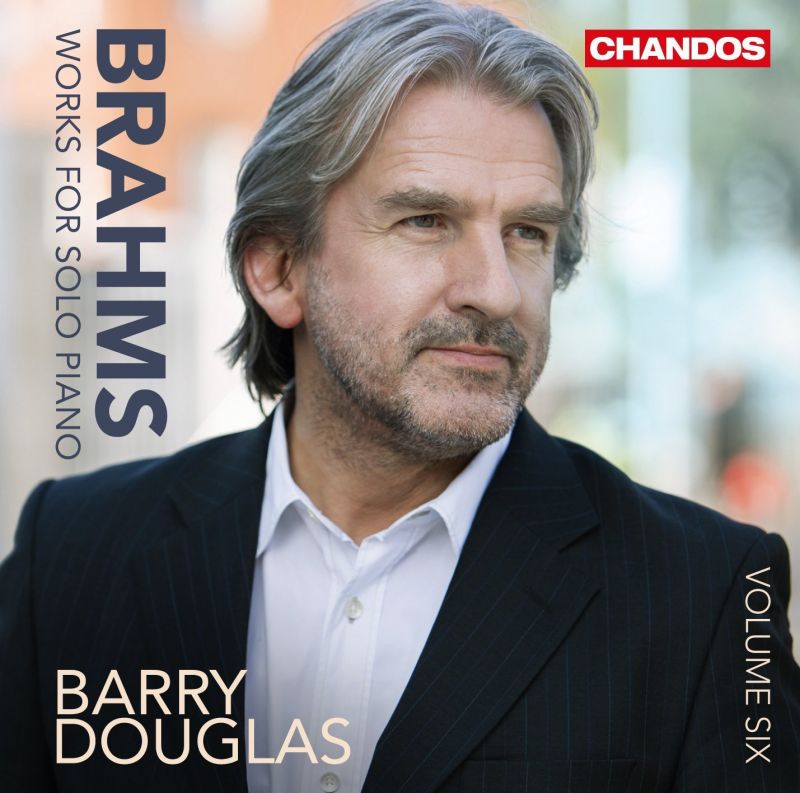BRAHMS Solo Piano Works
View record and artist detailsRecord and Artist Details
Composer or Director: Johannes Brahms
Genre:
Instrumental
Label: Chandos
Magazine Review Date: 09/2016
Media Format: CD or Download
Media Runtime: 77
Mastering:
DDD
Catalogue Number: CHAN10903

Tracks:
| Composition | Artist Credit |
|---|---|
| Rákóczy March |
Johannes Brahms, Composer
Barry Douglas, Piano Johannes Brahms, Composer |
| (6) Pieces, Movement: No. 6, Intermezzo in E flat minor |
Johannes Brahms, Composer
Barry Douglas, Piano Johannes Brahms, Composer |
| Canon |
Johannes Brahms, Composer
Barry Douglas, Piano Johannes Brahms, Composer |
| (2) Gigues |
Johannes Brahms, Composer
Barry Douglas, Piano Johannes Brahms, Composer |
| (8) Pieces, Movement: No. 5, Capriccio in C sharp minor |
Johannes Brahms, Composer
Barry Douglas, Piano Johannes Brahms, Composer |
| (8) Pieces, Movement: No. 7, Intermezzo in A minor |
Johannes Brahms, Composer
Barry Douglas, Piano Johannes Brahms, Composer |
| (8) Pieces, Movement: No. 8, Capriccio in C |
Johannes Brahms, Composer
Barry Douglas, Piano Johannes Brahms, Composer |
| Gavotte |
Johannes Brahms, Composer
Barry Douglas, Piano Johannes Brahms, Composer |
| (5) Piano Studies, Movement: Study after Chopin (arr of Etude Op 25/2 in F mino |
Johannes Brahms, Composer
Barry Douglas, Piano Johannes Brahms, Composer |
| (5) Piano Studies, Movement: Rondo after C M von Weber (arr of finale of PianoC, J138) |
Johannes Brahms, Composer
Barry Douglas, Piano Johannes Brahms, Composer |
| (5) Piano Studies, Movement: Presto in G minor I after Bach (arr of finale of S, BWV1001) |
Johannes Brahms, Composer
Barry Douglas, Piano Johannes Brahms, Composer |
| (10) Hungarian Dances, Movement: No. 2 in D minor |
Johannes Brahms, Composer
Barry Douglas, Piano Johannes Brahms, Composer |
| (10) Hungarian Dances, Movement: No. 5 in F sharp minor |
Johannes Brahms, Composer
Barry Douglas, Piano Johannes Brahms, Composer |
| (10) Hungarian Dances, Movement: No. 6 in D flat |
Johannes Brahms, Composer
Barry Douglas, Piano Johannes Brahms, Composer |
| (10) Hungarian Dances, Movement: No. 3 in F |
Johannes Brahms, Composer
Barry Douglas, Piano Johannes Brahms, Composer |
| (10) Hungarian Dances, Movement: No. 8 in A minor |
Johannes Brahms, Composer
Barry Douglas, Piano Johannes Brahms, Composer |
| (10) Hungarian Dances, Movement: No. 9 in E minor |
Johannes Brahms, Composer
Barry Douglas, Piano Johannes Brahms, Composer |
| (10) Hungarian Dances, Movement: No. 10 in E |
Johannes Brahms, Composer
Barry Douglas, Piano Johannes Brahms, Composer |
| (5) Piano Studies, Movement: Chaconne in D minor after Bach (arr of finale of V1016) |
Johannes Brahms, Composer
Barry Douglas, Piano Johannes Brahms, Composer |
Author: Jed Distler
Douglas’s hefty, full-bodied sound, built from the bottom up, befits the mellow power of Brahms’s sound world. He plays the three Op 76 selections outstandingly well, especially the C major, where his rubatos underline how the phrases often cross over the bar-lines. In the dark E flat minor Op 118 Intermezzo, most pianists focus attention on the right-hand melody and treat the rumbling left-hand lines as muted filigree. Douglas, however, does almost the exact opposite, and the effect is revelatory. His Hungarian Dances have plenty of fanciful ebb and flow, although some listeners may prefer crisper, more ebullient interpretations in the manner of Cédric Tiberghien or Julius Katchen. The little F minor Canon and the Gigues benefit from Douglas’s pointed clarity and control. Despite his more than capable performance, neither he nor any other pianist can convince me that Brahms’s literal-minded Rakoczy March arrangement isn’t a useless piece of dead weight (bring on Liszt’s 15th Rhapsody, please!).
As for Brahms’s challenging left-hand transformation of Weber’s Perpetuum mobile and the study after Chopin’s Op 25 No 2 Etude, where the quicksilver right-hand single line is rendered in sixths, Douglas is outclassed by Idil Biret’s faster, more assured and vividly detailed renditions. He holds Brahms’s left-hand transcription of the Bach D minor Chaconne together largely through nuanced rumination, emphasising poetry over the architectural concentration distinguishing Krystian Zimerman’s still unsurpassed and long out-of-print DG traversal. If you’ve been following Douglas’s often admirable yet inconsistent Brahms cycle from the start, you’ll know what to expect. That includes Chandos’s exemplary engineering.
Discover the world's largest classical music catalogue with Presto Music.

Gramophone Digital Club
- Digital Edition
- Digital Archive
- Reviews Database
- Full website access
From £8.75 / month
Subscribe
Gramophone Full Club
- Print Edition
- Digital Edition
- Digital Archive
- Reviews Database
- Full website access
From £11.00 / month
Subscribe
If you are a library, university or other organisation that would be interested in an institutional subscription to Gramophone please click here for further information.




